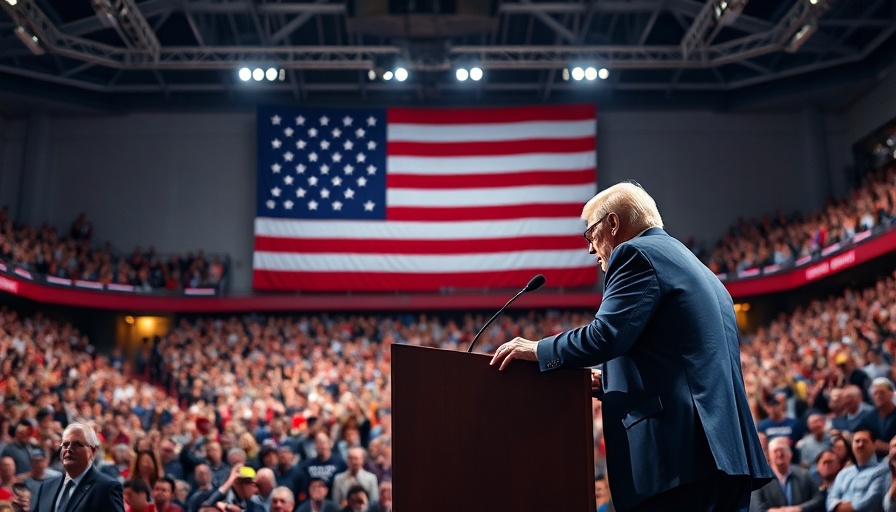
Unpacking Trump’s Commitment to Rollback EV and Climate Regulations
In a bold move that echoes his previous tenure, President Donald Trump has vowed to roll back numerous federal environmental regulations, igniting a heated debate that carries profound implications for Michigan's automotive industry and environmental landscape. With Trump’s return to office, Michigan could see a dramatic shift in its budding electric vehicle (EV) sector, which has recently gained momentum thanks to state investments and federal incentives.
The State's EV Industry: Resilience Amidst Uncertainty
Following Trump's announcements, stakeholders within Michigan's electric vehicle industry are treading a cautious path. With over $27 billion channeled into EV manufacturing and battery projects within the state, including significant investments from major automakers like General Motors and Ford, there’s a sense of determination to continue progressing despite potential policy rollbacks.
As evidenced by reports from stakeholders like Eric Frehsée, an auto dealer in Metro Detroit, the industry seems set on pivoting towards electric vehicles. “The investments aren’t ill spent,” Frehsée remarked, emphasizing that businesses in Michigan are preparing for the shift towards EVs, indicating a shared optimism even amidst the turbulent policy changes.
The Broader Implications: Environmental Protections Under Threat
Trump's emphasis on revitalizing fossil fuel industries often comes at the expense of environmental protections, including the rollback of critical tailpipe emission standards. Lee Zeldin, the EPA Administrator, noted this derailing of climate initiatives as the “most consequential day of deregulation in American history,” a claim that raised alarm bells among environmental activists.
The Michigan Environmental Council's chief policy officer, Charlotte Jameson, voiced concern over the impacts these rollbacks could have on public health and environmental protection. She stressed that stripping away regulatory frameworks could undermine advancements made in clean energy and potentially jeopardize the lives of residents who rely on clean air and water.
Future Predictions: The Stability of Michigan's EV Progress
With the proposed changes in policies, analysts are weighing the viability of Michigan’s EV industry amidst looming uncertainties. According to experts, the potential cancellation of the $7,500 tax credit and wider federal support for EV infrastructure could stifle consumer demand and investments in electric vehicles, recalling a similar narrative from the past when uncertainty over policies led to slow adoption rates.
Although EV sales nationally rose by 7.5% in 2024, the representation of EVs in Michigan was still low at 3.2% of new car sales. With competitive states and markets emerging globally, Michigan's EV industry must navigate a landscape sharpened by policy volatility.
Making Sense of the Transition
In light of the drastic changes, industry leaders in Michigan advocate for a forward-thinking approach. Ray Smith, an educator in Detroit’s EV training program, epitomizes this sentiment, indicating that the industry must move forward regardless of federal impacts. Educational initiatives like Smith's are crucial for equipping future technicians with skills tailored to an evolving market.
The heightened focus on training technicians and evolving dealership operations reflects a community prepared for change. Despite the pushback against Trump’s policies, Michigan stakeholders remain resolute in their vision for a sustainable automotive future. As the industry grapples with these regulations, the enthusiasm for EV advancements is palpable among many.
Consumers' Perspective: Understandable Frustrations
Consumer sentiment remains intertwined with federal incentives and regulatory changes. Concerns are growing that limiting or eliminating the incentives previously available for EV purchases could result in a setback for environmentally conscious buying decisions. The overwhelming demand for cleaner transportation options, touted by industry representatives, reflects a collective desire to foster a healthier planet.
As Trump’s administration reviews the existing laws governing electric vehicles and emissions, the question lingers: Will consumer demand sustain its momentum, or will regulatory shifts dissuade the uptake of electric vehicles?
Amidst this uncertainty, Michigan's EV industry holds a unique position at the crossroads of innovation and policy transformation. The balance between promoting economic resilience within the EV sector and maintaining integral climate standards remains of utmost importance. The road ahead will require careful navigation, but with the right commitment and policies, Michigan could emerge as a resilient leader in sustainable transportation.
As the narrative of electric vehicles in Michigan unfolds, stakeholders must stay engaged and proactive in advocating for the future they envision. It’s clear that the future of the automotive industry is electric—how Michigan adapts could determine whether they lead this remarkable charge or fall behind.
 Add Row
Add Row  Add
Add 




 Add Row
Add Row  Add
Add 

Write A Comment